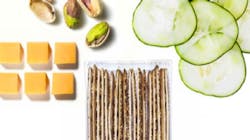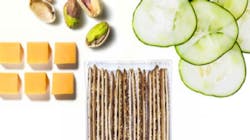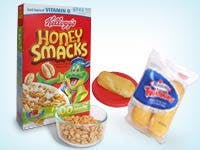diet strategies
By Maria Perno Goldie, RDH, MS
Approximately 97 percent of American adults snack between meals. For years, we got our calories from three meals a day, but now almost one-quarter of our calories come from snacks. The average calorie count and size of those snacks have grown over the years. That's enough to sabotage any attempt to lose weight, or keep it off. Snacking may play a role in weight control. Female dieters who snack between breakfast and lunch lose less weight compared to those who abstain from a mid-morning snack, according to a study led by researchers at Fred Hutchinson Cancer Research Center. The associations of timing and frequency of snacking with observed weight change and nutrient intake were assessed in an ancillary study to a 12-month randomized controlled trial in Seattle, Wash.(1) In the course of the year-long study, the researchers found that mid-morning snackers lost an average of 7 percent of their total body weight while those who ate a healthy breakfast but did not snack before lunch lost more than 11 percent of their body weight. For the study, a snack was defined as any food or drink that was consumed between main meals. These results suggest that snack meals can be a source for additional fruits, vegetables, and fiber-rich foods; however, snacking patterns might also reflect unhealthy eating habits and impede weight-loss progress. Future dietary weight-loss interventions should evaluate the effects of timing, frequency, and quality of snacks on weight loss.(1)
Approximately 97 percent of American adults snack between meals. For years, we got our calories from three meals a day, but now almost one-quarter of our calories come from snacks. The average calorie count and size of those snacks have grown over the years. That's enough to sabotage any attempt to lose weight, or keep it off. Snacking may play a role in weight control. Female dieters who snack between breakfast and lunch lose less weight compared to those who abstain from a mid-morning snack, according to a study led by researchers at Fred Hutchinson Cancer Research Center. The associations of timing and frequency of snacking with observed weight change and nutrient intake were assessed in an ancillary study to a 12-month randomized controlled trial in Seattle, Wash.(1) In the course of the year-long study, the researchers found that mid-morning snackers lost an average of 7 percent of their total body weight while those who ate a healthy breakfast but did not snack before lunch lost more than 11 percent of their body weight. For the study, a snack was defined as any food or drink that was consumed between main meals. These results suggest that snack meals can be a source for additional fruits, vegetables, and fiber-rich foods; however, snacking patterns might also reflect unhealthy eating habits and impede weight-loss progress. Future dietary weight-loss interventions should evaluate the effects of timing, frequency, and quality of snacks on weight loss.(1)
Here are some tips on snacking:1. Snack throughout the day. People who lose weight and keep it off don't skip meals or wait until they're ravenously hungry before they eat, according to the director of the Johns Hopkins Weight Management Center in Baltimore. If you spread your calories throughout the day, your blood sugar won't fall and you won't feel hungry. 2. Timing matters. Many people eat out of habit, rather than to satisfy real hunger. Mid-morning snackers also reach for more snacks during the day than the women who are more successful at losing weight.(1) 3. Eat nuts. Most people who are dieting believe they should stay far away from nuts, but are one of the healthiest snacks you can eat. They are not digested quickly, so they help you feel full longer, according to a preventive medicine specialist at the Mayo Clinic in Rochester, Minn. Some studies show that overall calories don't go up by much if you add nuts to a diet, because people seem to eat fewer calories from other sources.(2) 4. Plan ahead. Cut up some carrot, celery and cucumber sticks, pack them in a snack-size plastic bag and refrigerate. Take the bag with you when you go out the next morning, and you'll have a snack ready when hunger strikes.5. Prepack your portions. Count out 100 calories' worth of crackers or pretzels, and store each serving in a small plastic bag. When you feel a snack attack coming on, grab a single serving.6. Sip your food. Foods bulked up by water fill you up on fewer calories, so try a broth-based vegetable soup as a snack. Soup with broth and vegetables are a good snack choice.7. Pay attention when eating your snack. To avoid mindless eating, concentrate on your food. It is suggested that if you turn off the television, close your book, forget the crossword puzzle and give your attention to your food, you will enjoy it more and not eat mindlessly.8. Consider calcium. All of us need calcium, and snacking on fat-free dairy provides a great way to get more of this vital mineral without loading up on calories. Use a blender to whip up a thick, airy and filling smoothie with nonfat milk or yogurt, a banana, some frozen fruit and a few ice cubes.9. Focus on protein. Calorie for calorie, protein is the most satisfying food, fat the least satisfying. A high-protein, low-calorie snack is the best for curbing your appetite. Ideas are peanut butter on whole-grain crackers or a small serving of low-fat cottage cheese.10. Drink the good beverages. Beverages are excellent snacks as long as one avoids sugary drinks. Coffee, tea, and water are good choices, minus the sugary syrup and whipped cream. Instead of drinking fruit juice, which contains a lot of sugar, choose for the whole fruit, which contains fiber that helps you feel full.(3)
In a recent study, it showed that the genetic risk for cardiovascular disease may be modified by diet.(4) Members of the INTERHEART investigators showed that the genetic risk for cardiovascular disease conferred by several single nucleotide polymorphisms in the Chromosome 9p21 region may be decreased in individuals who consume a diet high in raw fruits and vegetables. These findings suggest that gene-environment interactions are important drivers of cardiovascular disease and raise the possibility that a sound diet can mediate the effects of 9p21 SNPs. The results of this study include analysis of two separate study populations comprising several ethnic groups, but will need to be confirmed in further large studies that have similar genetic and dietary information.(4)
Women who drink a couple of sugary soft drinks a day, even if they don't gain weight, have a greater chance of developing conditions that can lead to heart disease and diabetes.(5) The researchers compared middle-aged and older women who drank two or more sugar-sweetened beverages a day, such as carbonated sodas or flavored waters with added sugar, with women who drank one or fewer daily. Women consuming two or more beverages per day were nearly four times as likely to develop high triglycerides, and they were significantly more likely to increase their waist sizes and to develop impaired fasting glucose levels. The same associations were not observed in men.(5)
The CDC has a Guide to Strategies for Reducing the Consumption of Sugar-Sweetened Beverages.(6) So, bottom line, watch your caloric intake, sugary drinks, and snacks. Make every calorie count!References
1. Kong A, Beresford SAA, Alfano CM, Foster-Schubert KE, Neuhouser ML, Johnson DB, Duggan C, Wang C, Xiao L, Bain CE, and McTiernan A. D. Associations between Snacking and Weight Loss and Nutrient Intake among Postmenopausal Overweight to Obese Women in a Dietary Weight-Loss Intervention. Journal of the American Dietetic Association, Volume 111, Issue 12 , Pages 1898-1903, December 2011.2. UC Berkeley Wellness Letter, UC Berkeley Wellness Letter.com, May 2008.3. Nissa Simon. For Diet Success, Follow These 10 Tips on Snacking. AARP Bulletin, December 16, 2011.4. Do R, Xie C, Zhang X, Männistö S, Harald K, et al. (2011) The Effect of Chromosome 9p21 Variants on Cardiovascular Disease May Be Modified by Dietary Intake: Evidence from a Case/Control and a Prospective Study. PLoS Med 8(10): e1001106. doi:10.1371/journal.pmed.1001106. 5. newsroom.heart.org/pr/aha/_prv-sugar-sweetened-beverages-may-217750.aspx. 6. The CDC Guide to Strategies for Reducing the Consumption of Sugar-Sweetened Beverages. Sugar-Sweetened Beverage Guide. March 2010. p. 1-41. www.cdph.ca.gov/SiteCollectionDocuments/StratstoReduce_Sugar_Sweetened_Bevs.pdf.
1. Kong A, Beresford SAA, Alfano CM, Foster-Schubert KE, Neuhouser ML, Johnson DB, Duggan C, Wang C, Xiao L, Bain CE, and McTiernan A. D. Associations between Snacking and Weight Loss and Nutrient Intake among Postmenopausal Overweight to Obese Women in a Dietary Weight-Loss Intervention. Journal of the American Dietetic Association, Volume 111, Issue 12 , Pages 1898-1903, December 2011.2. UC Berkeley Wellness Letter, UC Berkeley Wellness Letter.com, May 2008.3. Nissa Simon. For Diet Success, Follow These 10 Tips on Snacking. AARP Bulletin, December 16, 2011.4. Do R, Xie C, Zhang X, Männistö S, Harald K, et al. (2011) The Effect of Chromosome 9p21 Variants on Cardiovascular Disease May Be Modified by Dietary Intake: Evidence from a Case/Control and a Prospective Study. PLoS Med 8(10): e1001106. doi:10.1371/journal.pmed.1001106. 5. newsroom.heart.org/pr/aha/_prv-sugar-sweetened-beverages-may-217750.aspx. 6. The CDC Guide to Strategies for Reducing the Consumption of Sugar-Sweetened Beverages. Sugar-Sweetened Beverage Guide. March 2010. p. 1-41. www.cdph.ca.gov/SiteCollectionDocuments/StratstoReduce_Sugar_Sweetened_Bevs.pdf.
Maria Perno Goldie, RDH, MS
To read previous articles in RDH eVillage FOCUS written by Maria Perno Goldie, go to articles.





